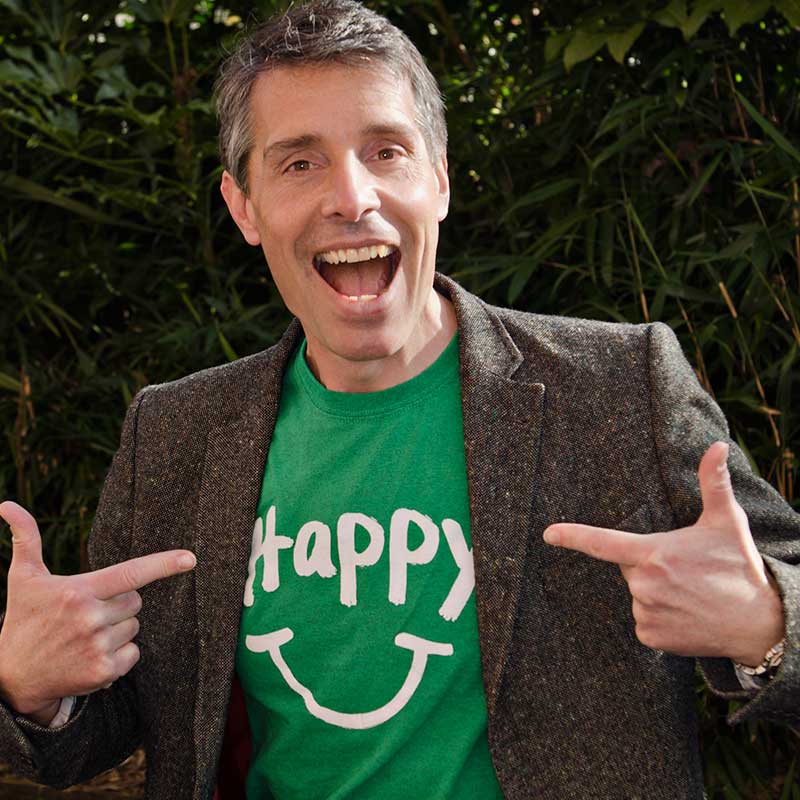 A short, late blog today, and a bit of a cheat too (OK, I admit it, I got sidetracked with Hallowe’en Strictly Comer Dancing – so sue me). So it’s a trick, but also a treat (see what I did there?) – here’s a sneaky preview of the bit in my interview with Andy Cope, author of Being Brilliant and The Little Book of Emotional Intelligence, that made me actually cry laughing.
A short, late blog today, and a bit of a cheat too (OK, I admit it, I got sidetracked with Hallowe’en Strictly Comer Dancing – so sue me). So it’s a trick, but also a treat (see what I did there?) – here’s a sneaky preview of the bit in my interview with Andy Cope, author of Being Brilliant and The Little Book of Emotional Intelligence, that made me actually cry laughing.
You’ll be able to hear the full thing in The Extraordinary Business Book Club on Monday, including his ephiphany in Tesco, and more on the longest PhD in history. Oh, and some great tips on writing and what it’s like working with an illustrator too.
Me: You say at the beginning, something about how authors say, you know, “Dip in and out, take what you want,” and you’re like, “None of that. No, you start at the beginning and you read through to the end.” I did like that, because I think actually, secretly, it’s what most authors really want their readers to do, but tell me why you felt it important to state that out loud?
Andy Cope: Well, I was just having a little go at one of my self-helper genre authors, David Taylor. He writes fantastic books, but he does say at the start of all his books, “You can dip in, dip out, whatever,” and I’m like, “No, NO!” J.K. Rowling with Harry Potter doesn’t say, “Oh, you can read this book in any order, just dip in.” No! She wrote it in that order because she wants you to read it in that order. I specifically have set this book out so it starts easy, and then it gets a little bit stodgy in the middle, and then it knocks your socks off at the end. I describe it like going to the swimming baths. You get your bathers on, and then you go out, first of all, you step through the chlorinated little bath, where your feet get wet but nothing else happens, so I take you through the chlorinated foot bath of academia first, because it’s not very challenging, and then we go in the shallow end, don’t we, and we splash around a bit and get a bit wet, until we get our confidence, and then, and only then, are you allowed in the deep end. If I chuck you in at the deep end first, you’ll die. We do get to the deep end in the book, but we start in the shallow foot bath of chlorinated academia. That’s a terrible phrase, isn’t it, but you know what I mean.
Me (slightly incoherently): That’s a first: it’s the first time I’ve actually cried laughing in an interview.
Andy Cope: Good. I mean, it starts off easy, it gets harder, that’s what I’m trying to say in a probably, not a very good way… the deal is, as the author, I want you to trust me. Trust me that actually, I’m going to hold your hand through this, and we are going to get to epigenetics at the end, and how you’ve been conned into thinking in certain ways, and if you can change your thinking, it’ll change your life. I can’t tell you that in chapter one. I need to get you there gradually.
Me: Laughing aside, I think that actually is such an important point, because I remember, years ago, we were looking at delivering up chapters of monographs as sort of separate entities that you could buy, and it just didn’t work, because they weren’t written that way. That chapter depended on the concept that was introduced in the chapter before it, and at the end, it’s taking you on somewhere else, and without the following chapter, it doesn’t make sense. I think it’s a really important point to bear in mind when you’re planning your book, is that there is that structure. It’s also a really important point to bear in mind as a reader, because I dip in and out of books, I do, but there’s something about coming to a book, showing up to a book as a reader, with that sense of commitment, and acknowledgment of the author’s intention, and just sitting and engaging with it, and doing nothing else. That’s quite important, isn’t it?
Andy Cope: Good, well, I’m interested that you picked that bit out, because I was really, you know, I think that’s quite important. For other people, that might be fine, you want to write a book that people can dip in and out of, that’s great, but mine is written in a specific way, in a specific structure, and I just thought that it was worth saying at the beginning, really. “If you’re going to read it, this is how you read it. If you’re not onto that, put it down now.” No, no, exactly, exactly. I don’t want a bad Amazon review from someone who’s going, “Well, I started on chapter eight and it didn’t make any sense…” Well, it WON’T make sense on chapter eight!
Just wait til you hear it in a Bury accent.
I’m an inveterate dipper when it comes to nonfiction. I’m in the deep end, footbath, shallow end, back out into the showers, all over the place. Which I now realise is actually pretty reprehensible. I consider myself properly told off, and from now on I’ll try to remember Andy’s passionate call to readerly common sense, which reminds me of the instruction the King gives to the White Rabbit in Alice in Wonderland:
“Begin at the beginning,” the King said gravely, “and go on till you come to the end: then stop.”
